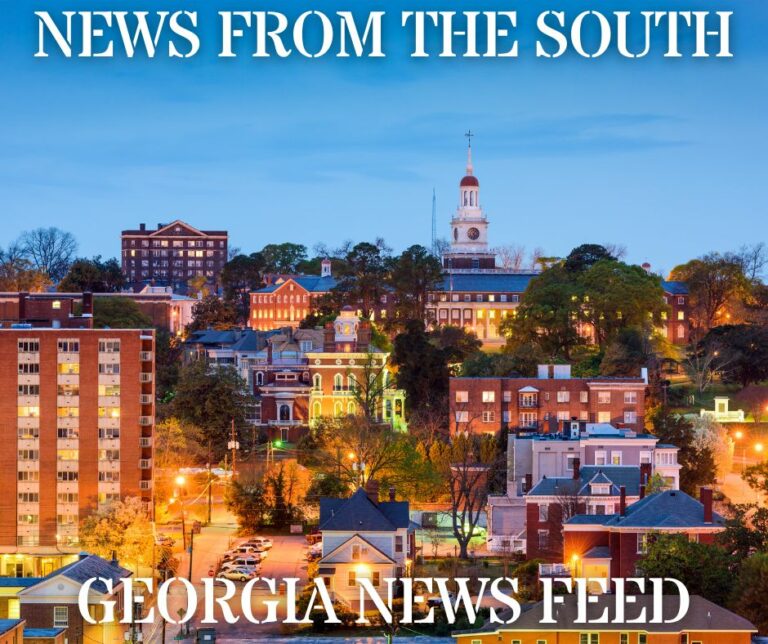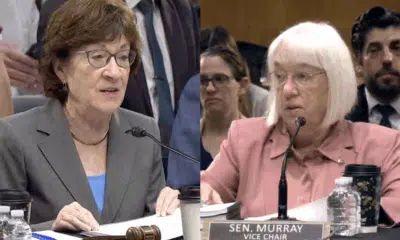News from the South - North Carolina News Feed
Here’s what I learned from this election — and it’s not all doom and gloom • Asheville Watchdog
From what I hear, we had an election last week.
A big ‘un. A humdinger, game changer, end of the world, etc., etc.
Yeah, from a Democrat’s perspective, it was bad. Kamala Harris lost decisively to Donald Trump, a man barren of morals who encouraged a deadly insurrection on our capital, flouted the law repeatedly, and made bullying the hallmark of his campaign.
We have learned many lessons from this election, and from Mr. Trump, but I’m not going to dwell on those today. All I’ll say is that the American people will tolerate a level of dishonesty, crass behavior and immorality previously thought disqualifying for any presidential candidate.
With Republicans heading toward control of all three branches of government, we will see a transformation of our country over the next two years that could devastate the environment, public health and yes, even consumer prices.
Shall we forever more remember that it is, indeed, the economy, stupid. And well, immigration.
But let’s move on. It’s not all doom and gloom for Democrats, at least on the state and local levels, partly because North Carolina has a delightful habit of going for yin and yang when it comes to elections. This time we went solidly for Trump as president but overwhelmingly for Democrat Josh Stein as governor.
And on the Council of State, Democrats won a bunch of offices: lieutenant governor, attorney general, secretary of state and superintendent of public instruction. Republicans won these: state auditor, agriculture commissioner, insurance commissioner, labor commissioner and treasurer.
“(Democrats) won half, so they gained a seat on the Council of State,” Western Carolina University political scientist Chris Cooper said last week. (I’m required by law to shoot the bull with Cooper after every major election.) “They kept the First Congressional District, which was the only competitive district in the state. They clawed back the super majority.”
“It was not a bad night for Democrats in North Carolina,” Cooper said.
Hey, we’re not blue, but we’re kind of purplish. OK, maybe mauve. Ish.
Hey, we still have two very conservative U.S. senators. But the Dems’ success on the state level remains notable.
“The song remains the same, as Led Zeppelin said,” Cooper said, referring to our dual personality and purple streak. “It’s the same story. What’s interesting or different is that some other states joined us.”
In 2020, only five Democrats won election when they were on the same statewide ballot as Trump, and four of those were in the state of North Carolina, Cooper said.
“This time, there were some Democrats who still were elected in Trump states, and it’s because he won all the battlegrounds,” Cooper said.
But let’s get back to the super-majority issue, and the governor’s veto, probably the election’s most important development.
For the past several years, Gov. Roy Cooper’s vetoes have been mostly meaningless, as the Republicans could override them at will, thanks to a super majority provided by Mecklenburg Rep. Tricia Cotham, who switched from Democrat to Republican in 2023.
Having a Democratic governor with real veto power is huge for progressives and the future of state legislation, Cooper said.

“I think the Stein victory is, of course, important, and we saw it coming,” Cooper said. “But it means so much more for the Democrats because it comes in conjunction with breaking the super majority.”
The veto is the “one legislative tool that the governor has in his toolbox, and if the Republicans had maintained the super majority, they could have overridden his veto without a single Democrat on their side,” Cooper said.
“So in practice, that means they could pass any legislation they wanted without a single Democrat agreeing,” Cooper continued. “It would have been a one-party state in terms of the legislation coming out of Raleigh.”
So, that’s pretty huge.
Another takeaway from this election is that Buncombe County is more Democratic than ever, even in the one territory Republicans made an effort to claim through favorable redistricting, House District 115, where Rep. Lindsey Prather, D-Buncombe, was the incumbent. She ran against Republican Ruth Smith, pulling out a victory with 51.4 percent of the vote.

As Cooper said, “It was close, but it wasn’t,” as Prather’s victory is safely out of recount territory.
“In that district, based on the 2020 vote, it favored the Republican Party by a few percent, so really, she outperformed her district by probably five percentage points,” Cooper said. “I think the reality is that probably means the district’s changed since 2020 — more people moving in. It’s liberalizing.”
Cooper is skeptical that another Republican will make it to the North Carolina House in Buncombe County in the foreseeable future.
On the flip side, I don’t see a Democrat going to Congress from the 11th District in my lifetime. (And yes, let’s hope that’s longer than, say, five or 10 years.) Democrat Caleb Rudow challenged incumbent Chuck Edwards, who delivered a beatdown, winning just less than 57 percent of the vote — and I thought Rudow ran a good campaign and was a very likable candidate.

Football hero Heath Shuler, a former NFL quarterback and Swain County native, was the last Democrat to hold that office, and he was essentially a Republican in many regards. Unless Shuler wants to run again, look for Edwards to stay in as long as he wants.
Speaking of beatdowns, Amanda Edwards put one on former Buncombe County Sheriff Van Duncan, who ran as an unaffiliated candidate in their race for the chair of the Buncombe County Board of Commissioners, taking 60.7 percent of the vote to Duncan’s 39.3. Duncan, a former Democrat, left the party after he said it essentially left him by drifting too far left.
Edwards hammered Duncan on his acceptance of a $125,000 retirement payout or retention bonus (depending on your point of view). But I don’t think that’s what did in Duncan, who was a highly popular sheriff.

I think what got him is he ran as an unaffiliated candidate in a very Democratic County and didn’t have any party backing.
Cooper has written a lot about unaffiliated candidates and how they have a steep uphill battle in North Carolina, first to even get on the ballot and then to actually win.
“It just shows unaffiliated candidates can’t win,” Cooper said. “Four years, maybe two years from now, we’ll have another person read ‘Don Quixote’ and start tilting at windmills.”
“He was the best possible unaffiliated candidate and he didn’t come close,” Cooper said.
Which brings me to the end of today’s column.
Let’s start talking about that 2028 race! I can’t wait for the text messages to start!
[Correction: An earlier version of this column misidentified the House district in which Rep. Lindsey Prather, D-Buncombe, was the incumbent and the victor. It is District 115. The column also misstated Chuck Edwards’s percentage of the vote total in his race against Caleb Rudow. He won just less than 57 percent.]
Asheville Watchdog is a nonprofit news team producing stories that matter to Asheville and Buncombe County. John Boyle has been covering Asheville and surrounding communities since the 20th century. You can reach him at (828) 337-0941, or via email at jboyle@avlwatchdog.org. The Watchdog’s local reporting during this crisis is made possible by donations from the community. To show your support for this vital public service go to avlwatchdog.org/support-our-publication/.
Related
The post Here’s what I learned from this election — and it’s not all doom and gloom • Asheville Watchdog appeared first on avlwatchdog.org
News from the South - North Carolina News Feed
Asheville’s Urban Forestry Commission speaks for the city’s trees. It hasn’t met since Helene. • Asheville Watchdog
Asheville’s Urban Forestry Commission met on Sept. 3, 2024, with an agenda that, if unexceptional, represented the kind of work the volunteer advisory board had done since its inception at the beginning of the decade.
Its members heard an update from Keith Aitken, who a year earlier had become Asheville’s forester after the UFC successfully lobbied the city to create the position. They voted to recommend the approval of a landscaping plan for a Duke Energy substation on Rankin Avenue. And they discussed the Urban Forest Master Plan, for which City Council had approved funding that June. Local environmentalists, including the UFC, had long advocated for a roadmap for protecting and growing the city’s canopy; now one was finally on the way, with a public tree inventory and satellite analysis ready to begin.
Then Tropical Storm Helene tore the urban canopy asunder. In its aftermath, the city paused work on the Master Plan and indefinitely suspended all advisory boards, including the UFC.
Eleven months later, the UFC still has not reconvened, the Master Plan is still on hold, and their purgatorial state is causing growing alarm among advocates who see this period of recovery as a particularly crucial moment for Asheville’s trees.
Though local tree loss has not been thoroughly quantified, the North Carolina Forest Service has estimated that 40 percent of trees in Buncombe County but outside the city limits were damaged; one analysis of hundreds of fallen trees within Asheville found that the city’s medium-to-large hardwoods fared particularly poorly. Meanwhile, one of the city’s largest contiguous forested areas is on the chopping block, as the University of North Carolina Asheville is pursuing a proposal to replace 45 wooded acres with a 5,000-seat soccer stadium and surrounding development.

“Of all the times when you really need (a master plan), you’d think now would be the time, when we’re trying to think of how to prevent the next disaster caused by too much pavement and too much building and not enough stormwater absorption and not enough green infrastructure,” said Steve Rasmussen, a member of the volunteer Tree Protection Task Force for Asheville and Buncombe County, which has worked closely with the UFC.
When the UFC formed in 2020, it was part of a focus on trees that local environmentalists felt was sorely needed; a study commissioned by the city the previous year had found canopy loss of more than 6 percent coinciding with population growth over the previous decade. The UFC’s predecessor, the Tree Commission, had a narrower purview, as did the canopy ordinance the city had in place for decades. Between the UFC’s inception and the post-Helene pause, according to UFC documents, the city preserved more than 2.5 million square feet of canopy, planted about 400,000 more, and collected roughly $300,000 in fees related to landscape compliance rules.
Aitken, the city forester, was not available for an interview for this story, city spokesperson Kim Miller said. In an email, Miller pointed toward the creation of Aitken’s position and to the 2020 city ordinance that expanded canopy protections.
“The master plan contract remains in place as staff assesses the next best steps forward,” she said. “We will announce the restart of the planning process and opportunities for community involvement in the coming months.”
The UFC doesn’t have to meet for the plan to move forward; the city has already chosen its contractor and approved $269,000 in spending, and as an appointed advisory board, the UFC weighs in on city matters but doesn’t have decision-making authority.
But keeping the UFC dormant could deprive the public of an important conduit to city officials, one more powerful than sending an email or speaking for three minutes during a council meeting’s public comment section, Rasmussen said.
“It really helps to have an advocacy group, and for people in general it really helps to have a place to take their concerns about trees and tree protections and have them addressed. The UFC has been one of the most active of all these boards and commissions.”
Zoe Hoyle, the UFC’s most recent chairperson, said the advisory board could play an important role in engaging the public as the city continues to respond to Helene and, eventually, restarts the Urban Forest Master Plan.
“I think it’s really important that we do something that marks us out as a city” in Helene’s wake, she said. “‘Transformative’ is the word I like to use.”
Alison Ormsby, the co-chairperson of the Tree Protection Task Force, said she would have liked to see the UFC continue to meet after Helene — helping to steer the city’s recovery as it pertained to trees and green spaces and acting as a watchdog as criticism proliferated over the debris-removal practices of the U.S. Army Corps of Engineers and its paid-by-volume contractors.
“Eric North, a program manager for the Arbor Day Foundation, which administers the Tree City program, said in an email Asheville began its application last year but, like some other communities preoccupied by hurricane recovery, didn’t finish it. who could provide really useful input on storm response,” she said.
Future of city’s advisory boards uncertain
The UFC’s uncertain future is part of a bigger question the city now faces: What will it do about its many advisory boards? It had 13 active ones before Helene and two others that existed in name but hadn’t met for years. The boards have been paused largely because city staff hasn’t had time to help them run their meetings.
At a City Council meeting last week, city staff offered one path forward, a plan to keep the advisory boards on hold and reassemble some of their members into four so-called recovery boards. Assistant City Manager Ben Woody said the proposed arrangement would be more efficient, and eventually the individual advisory boards could still meet or take on tasks as the city wishes.

The city’s Boards and Commissions Realignment Working Group has proposed an alternate plan in which it would voluntarily help publicize and run advisory board meetings. Councilmember Kim Roney supported the idea, saying she believed it’s time for the boards to get back to work.
“I don’t know everything about everything,” she said. “But when we invite our neighbors to bring their professional and lived experience to the table, we can make better decisions as a council.”
But City Attorney Brad Branham threw cold water on the idea. Though he stopped short of shutting it down entirely, he said he worried about the boards inadvertently violating open meetings laws in the absence of city staff. Such an error could cause legal trouble for the city, he said.
Those close to the UFC hold out some hope that the city will entertain the Realignment Working Group idea. Hoyle said she has concerns about the recovery-boards plan. She believes UFC members would need seats on all four boards to be effective. (A draft Woody presented last week has UFC members on the proposed Economy and Infrastructure boards — but not on the People & Environment board.) And while advisory boards could still be called upon for occasional work, Hoyle worries the lack of regular structure would undermine that expectation.
“Our current members could lose interest and just disappear,” she said. “I don’t know what the mechanism will be for replacing our membership.”
To some observers, the progress on tree issues in recent years now feels fragile. Even Asheville’s Tree City USA distinction, which it held for nearly 45 years, has lapsed. Eric North, a program manager for the Arbor Day Foundation, which administers the Tree City program, said in an email Asheville began its application last year but, like some other communities preoccupied by hurricane recovery, didn’t finish it. He said the Foundation would welcome the city’s reapplication this year.
But to meet Tree City standards, Asheville would need a functional tree-focused board or department.
“We no longer fit the criteria,” Ormsby said. “Some folks have said we don’t deserve it.”
Asheville Watchdog welcomes thoughtful reader comments about this story, which has been republished on our Facebook page. Please submit your comments there.
Asheville Watchdog is a nonprofit news team producing stories that matter to Asheville and Buncombe County. Jack Evans is an investigative reporter who previously worked at the Tampa Bay Times. You can reach him via email at jevans@avlwatchdog.org. The Watchdog’s reporting is made possible by donations from the community. To show your support for this vital public service go to avlwatchdog.org/support-our-publication/.
Related
The post Asheville’s Urban Forestry Commission speaks for the city’s trees. It hasn’t met since Helene. • Asheville Watchdog appeared first on avlwatchdog.org
Note: The following A.I. based commentary is not part of the original article, reproduced above, but is offered in the hopes that it will promote greater media literacy and critical thinking, by making any potential bias more visible to the reader –Staff Editor.
Political Bias Rating: Center-Left
The article presents a detailed account of Asheville’s Urban Forestry Commission and related environmental efforts, emphasizing local advocacy, preservation, and sustainable urban planning. The tone supports environmental protection and community involvement, topics often aligned with progressive or center-left priorities. However, it remains fact-focused and refrains from overt political rhetoric or partisan framing. It highlights concerns over government delays and environmental degradation without explicit ideological critique, reflecting a measured, policy-oriented perspective consistent with a center-left viewpoint focused on green issues and civic engagement.
News from the South - North Carolina News Feed
Trump’s executive order could worsen state’s involuntary commitment system
SUMMARY: President Trump’s executive order easing removal of homeless individuals into mental health or addiction treatment raises concerns among North Carolina advocates and experts. They fear the order could worsen the overused and harmful involuntary commitment system, which already traps many without adequate legal representation or treatment in overwhelmed emergency departments. Expanding criteria for commitment to include those unable to care for themselves may increase institutionalization beyond current state capacity. Advocates argue the order criminalizes homelessness and lacks housing solutions, violating civil liberties. They call for community-based prevention, peer support, and improved services rather than widespread forced commitments, which can do more harm than good.
The post Trump’s executive order could worsen state’s involuntary commitment system appeared first on ncnewsline.com
News from the South - North Carolina News Feed
Back-to-School meals don’t have to be boring
SUMMARY: Back-to-school meals don’t have to be boring. To help kids focus and perform well, breakfasts should include protein, healthy fats, fiber, and carbohydrates. Ideas include whole wheat toast with nut butter and fruit, breakfast burritos with eggs and veggies, or veggie-filled egg muffins prepared in advance. For lunch, homemade “Lunchables” with low-sodium meat, cheese, whole wheat crackers, veggies, and fruit offer nutrition and variety. Leftover pasta with veggies and hummus or chicken salad with fruit and crackers are healthy options. Always pack water for hydration, and keep cold foods safe with at least two cold packs in lunchboxes.
Back-to-school meals don’t have to be boring. Some healthy options for your children.
https://abc11.com/backtoschool/
Download: https://abc11.com/apps/
Like us on Facebook: https://www.facebook.com/ABC11/
Instagram: https://www.instagram.com/abc11_wtvd/
Threads: https://www.threads.net/@abc11_wtvd
TIKTOK: https://www.tiktok.com/@abc11_eyewitnessnews
-
News from the South - Texas News Feed6 days ago
Rural Texas uses THC for health and economy
-
Mississippi Today3 days ago
After 30 years in prison, Mississippi woman dies from cancer she says was preventable
-
News from the South - Alabama News Feed7 days ago
Decision to unfreeze migrant education money comes too late for some kids
-
News from the South - Georgia News Feed4 days ago
Woman charged after boy in state’s custody dies in hot car
-
Mississippi Today7 days ago
They own the house. Why won’t they cut the grass?
-
News from the South - Arkansas News Feed7 days ago
Trump’s big proposed cuts to health and education spending rebuffed by US Senate panel
-
News from the South - Georgia News Feed7 days ago
Delta jet makes emergency landing | FOX 5 News
-
Mississippi News Video7 days ago
Jones County investigators work to solve 2011 cold case












































